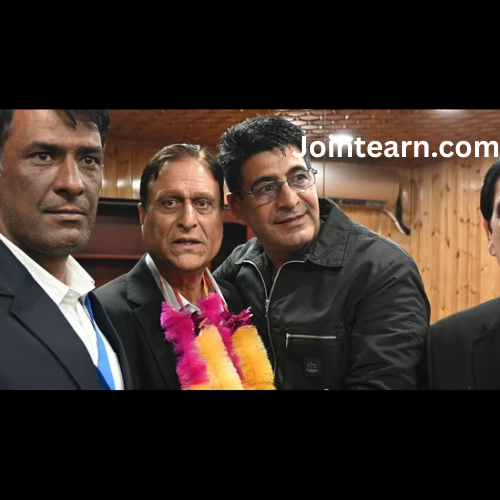
In a significant political development, the Jammu and Kashmir National Conference (JKNC), led by Chief Minister Omar Abdullah, swept the Rajya Sabha elections in Jammu and Kashmir, winning three out of four seats, while the Bharatiya Janata Party (BJP) managed to secure only one. The victory marks a strong show of confidence in the ruling JKNC and underscores its continued political dominance in the Union Territory’s evolving political landscape.
JKNC Secures Three Rajya Sabha Seats
The elections, held on Friday, saw senior JKNC leader Choudhary Mohammad Ramzan emerge victorious, winning his Rajya Sabha seat by a comfortable margin of 58 votes. Alongside him, fellow party leaders Sajad Kichloo and Shammi Oberoi were also declared winners, solidifying the National Conference’s commanding position in the Upper House representation from Jammu and Kashmir.
In an official statement shared on X (formerly Twitter), the National Conference wrote:
“JKNC senior leader Choudhary Mohammad Ramzan has been elected to the Rajya Sabha from Jammu and Kashmir, winning by 58 votes. Congratulations!”
Party offices in Srinagar and Jammu reportedly erupted in celebration following the announcement, with supporters hailing the win as a “triumph of regional unity and trust in Omar Abdullah’s leadership.”
BJP Manages One Seat Amid Fierce Contest
The BJP, which had been hoping to make deeper inroads in the region, managed to win only one seat. The victory went to Jammu and Kashmir BJP President Sat Paul Sharma, who secured 32 votes, defeating NC candidate Imran Nissar, who garnered 22 votes.
While the BJP’s performance fell short of expectations, party leaders maintained that the outcome still reflected a “strong foothold” in Jammu, one of the BJP’s core support bases. Sharma, after his victory, expressed gratitude to the party cadre and reaffirmed the BJP’s commitment to “representing the aspirations of the people of Jammu in Parliament.”
Seats Vacant Since 2021
The elections come after a three-year gap, as all four Rajya Sabha seats from Jammu and Kashmir had remained vacant since February 2021, following the retirement of Ghulam Nabi Azad, Mir Mohammad Fayaz, Shamsher Singh, and Nazir Ahmed Laway. The long delay was largely attributed to the political reorganization following the abrogation of Article 370 and the subsequent bifurcation of the former state into two Union Territories.
This Rajya Sabha election marks the first such contest in a decade for the region, signaling a step toward political normalization and institutional continuity after years of uncertainty.
Omar Abdullah’s Strategic Preparation and Congress Backing
The JKNC’s sweeping victory did not come as a surprise to many observers, as Chief Minister Omar Abdullah had expressed strong confidence earlier in the week that his party would secure all four Rajya Sabha seats with the support of allies and independents.
Speaking to reporters on October 22, Abdullah had emphasized the strategic unity of non-BJP forces:
“This session is different from other sessions. Rajya Sabha elections will be held after 10 years in Jammu and Kashmir. We decided on a strategy in the meeting so that the National Conference wins all four seats. I thank Tarigami and other independent leaders who joined the meeting.”
He also commented on the Congress Party’s stance, which, despite holding a separate internal meeting, was expected to align with the JKNC to prevent BJP gains.
“They had their own meeting. They have reiterated that they would not support the BJP. They have their own way; their leadership here has to wait for the high command’s signal. This is not new, and no one should have a problem with it. Their high command would not signal to favour the BJP,” Abdullah said.
Political analysts note that the National Conference’s coordination with the Congress and left-leaning independents proved decisive in consolidating the anti-BJP vote and ensuring a near-clean sweep.
Implications for Jammu and Kashmir Politics
The outcome significantly boosts the National Conference’s influence both in Jammu and Kashmir and in national politics. With three of the four Rajya Sabha seats under its control, the JKNC now has a stronger voice in Parliament at a time when discussions around the restoration of statehood and local autonomy continue to dominate political discourse.
For Omar Abdullah, this victory is also a personal and political vindication, reinforcing his leadership within the party and among regional allies. It strengthens his position ahead of future assembly elections, where the JKNC hopes to consolidate its base amid ongoing debates over governance and representation in the post-Article 370 era.
Conversely, the BJP’s limited success — confined to one seat — suggests a plateauing of its political momentum in the region, particularly in the Valley. While it retains a strong base in Jammu, the inability to expand influence across regions underscores the challenges it faces in navigating the complex sociopolitical landscape of Jammu and Kashmir.
Upcoming Political Developments
The Union Territory’s political calendar remains packed, with bypolls for the Nagrota and Budgam assembly constituencies scheduled for November 11. The Nagrota seat fell vacant following the demise of MLA Devender Singh Rana, while the Budgam seat opened after Omar Abdullah’s resignation earlier this year.
These bypolls are expected to serve as another crucial test for both the JKNC and the BJP, as they seek to gauge voter sentiment ahead of the long-anticipated full assembly elections, which could restore an elected government to the region for the first time since 2018.
Conclusion
The Jammu and Kashmir Rajya Sabha elections of 2025 mark a turning point in the region’s re-emerging democratic process. The National Conference’s decisive win reflects not only its organizational strength but also the enduring support it enjoys among legislators and local leaders.
For the BJP, the single-seat win offers limited consolation but keeps it in play as a key national stakeholder in Jammu and Kashmir politics.
As the Union Territory continues its gradual return to political normalcy, these results signal a renewed assertion of regional parties and traditional leadership — with Omar Abdullah’s National Conference reclaiming its status as the preeminent political force in Jammu and Kashmir’s evolving landscape.


Leave a Reply